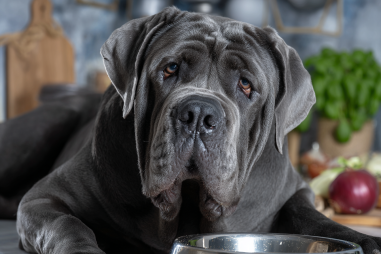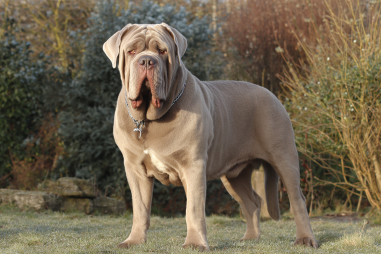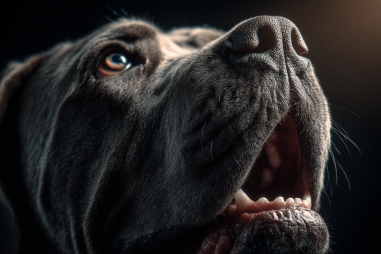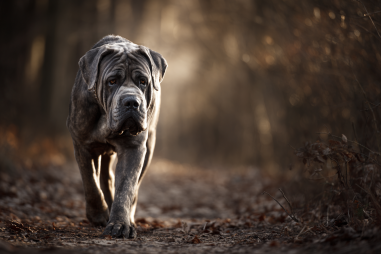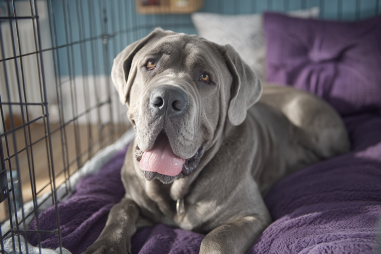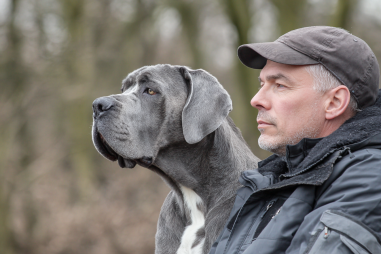Watching your Neapolitan Mastiff grow older is a bittersweet experience, filled with moments of joy and a few challenges. These gentle giants transition from exuberant youngsters to wise seniors who deserve a little extra care and attention. As they age, their physical and emotional needs evolve, requiring adjustments in how you support their health, comfort, and overall happiness. This guide offers practical advice on navigating the senior years of your Neapolitan Mastiff, ensuring they enjoy their golden days with dignity and comfort.
Signs of Aging in Neapolitan Mastiffs
Neapolitan Mastiffs typically start showing signs of aging around 6 to 8 years old, although this can vary with each individual. Recognizing these signs early helps in adapting their care to meet new needs.
Common signs include:
- Decreased Energy: You might notice your dog is less playful and tires more easily during walks or playtime.
- Joint Stiffness and Mobility Issues: Difficulty rising, limping, or reluctance to climb stairs can indicate arthritis or other joint problems common in large breeds.
- Changes in Sleep Patterns: Your Mastiff may sleep more or have trouble settling down comfortably due to aches or discomfort.
- Hearing or Vision Decline: Aging dogs may respond more slowly to sounds or visual cues, which affects their interactions and safety.
- Changes in Appetite or Weight: A decrease or increase in appetite can indicate health issues; unexpected weight changes should be monitored closely.
- Cognitive Changes: Senior dogs sometimes experience confusion or disorientation, known as canine cognitive dysfunction.
Adjusted Diet and Nutrition
Nutrition plays a crucial role in maintaining your Neapolitan Mastiff’s health as they age. Senior dogs generally have a slower metabolism and lower energy requirements, so their diet should be adjusted accordingly.
Consider the following dietary tips:
- High-Quality Protein: Maintain muscle mass with easily digestible, high-quality protein sources to support their strength and recovery.
- Controlled Calories: Avoid excess weight gain by providing meals with fewer calories but rich in nutrients.
- Added Joint Support: Incorporate foods or supplements rich in glucosamine, chondroitin, and omega-3 fatty acids to support joint health and reduce inflammation.
- Fiber Content: Increased fiber can improve digestion and help prevent constipation, which can be more common in older dogs.
- Hydration: Always ensure fresh water is readily available, as older dogs are prone to dehydration.
It’s a good idea to consult your veterinarian about the best senior dog food options or any supplements that could benefit your Neapolitan Mastiff specifically.
Exercise Modifications and Mental Health
While your senior Mastiff may not be able to enjoy the same level of vigorous exercise as in younger years, physical activity remains vital for their health and mental well-being.
Tips for exercising your aging Neapolitan Mastiff include:
- Gentle, Consistent Walks: Shorter, more frequent walks help maintain muscle tone and keep joints moving without overstressing them.
- Low-Impact Activities: Swimming or gentle play sessions can ease joint strain while providing beneficial exercise.
- Stretching and Massage: Gentle stretching and massages can improve circulation and reduce stiffness.
- Mental Stimulation: Engage your dog with puzzle toys, training sessions, or scent games to keep their mind sharp and reduce anxiety or boredom.
Remember to always observe your Mastiff during activity and stop if they show signs of discomfort or fatigue.
Managing Joint and Health Problems
Neapolitan Mastiffs are prone to joint issues such as hip and elbow dysplasia, arthritis, and other age-related conditions. Proactive management is key to maintaining their quality of life.
Steps to manage these problems include:
- Regular Vet Check-Ups: Early diagnosis through routine veterinary visits can help catch and treat joint issues before they worsen.
- Medication and Supplements: Your vet may recommend pain relievers, anti-inflammatory medications, or joint supplements to ease discomfort.
- Weight Management: Keeping your dog at a healthy weight reduces stress on joints.
- Physical Therapy: Some seniors benefit from professional physical therapy to regain mobility and reduce pain.
- Monitor Other Health Conditions: Senior dogs may develop heart, kidney, or vision problems that require specialized care.
Creating a Comfortable Living Environment
Making your home senior-friendly can significantly enhance your Mastiff’s comfort and safety.
Some adjustments to consider:
- Soft, Supportive Bedding: Provide orthopedic dog beds to cushion aching joints.
- Accessible Areas: Use ramps to replace stairs where possible, and limit slippery floors with rugs or mats.
- Warmth: Older dogs are more susceptible to cold; keep their resting areas warm and draft-free.
- Quiet Space: Senior dogs appreciate calm, quiet zones where they can rest undisturbed.
- Easy Access to Essentials: Make sure your dog can easily reach water, food, and outdoor areas for relieving themselves without strain.
When to Consult Veterinary Specialists
Regular veterinary care is essential, but certain situations warrant the expertise of specialists to ensure your Neapolitan Mastiff receives optimal care in later years.
Consider referral to specialists if your dog experiences:
- Chronic Pain or Mobility Loss: A veterinary orthopedist or neurologist can provide advanced diagnostics and treatment options.
- Complex Medical Conditions: Endocrinologists, cardiologists, or internal medicine specialists may be needed for conditions like diabetes, heart disease, or kidney failure.
- Cognitive Decline: Veterinary behaviorists can help manage symptoms of canine cognitive dysfunction.
- Nutrition Consults: Veterinary nutritionists can develop customized diets tailored to your dog’s health needs.
Early intervention by specialists can often improve outcomes and enhance your dog’s quality of life during their senior years.
Caring for your aging Neapolitan Mastiff is a heartfelt journey. By recognizing the signs of aging, adapting their diet and exercise, managing health issues proactively, and making their environment safe and comfortable, you ensure that your loyal companion enjoys their twilight years with the love and dignity they deserve. With attentive care and compassion, you’ll continue to create beautiful memories together.


